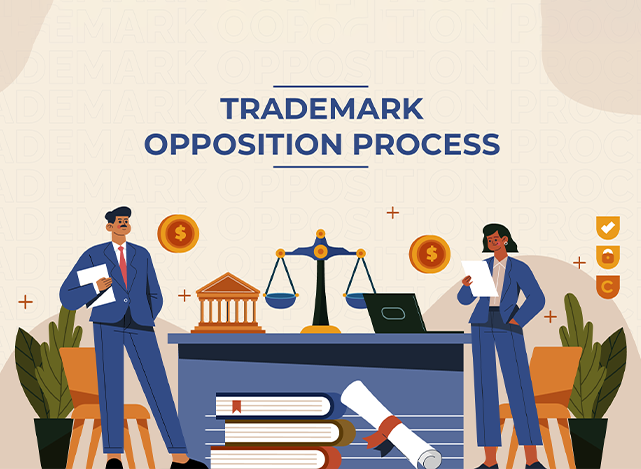Trademark opposition is a legal challenge against the registration of a trademark, initiated during its four-month publication period in the official government journal

About Trademark Opposition
Trademark opposition is a legal process where a third party disputes a trademark application. It’s filed with the trademark oice after publication of the application. The opposing party raises objections, such as similarity to their trademarks or legal violations. Both sides present arguments and evidence. The trademark oice decides whether to grant or deny registration. If opposition succeeds, the application may be refused or amended.
Document required for trademark opposition
- Notice of Opposition:
- Formal statement of opposition grounds and opposing party’s details.
- Evidence of Standing:
- Documents confirming opposing party’s legal right to oppose, such as prior trademark ownership or relevant interest.
- Grounds for Opposition:
- Supporting evidence and legal arguments for opposition, including similarity to existing trademarks, lack of distinctiveness, or legal violations.
- Evidence of Prior Use:
- Documentation demonstrating opposing party’s prior use of similar trademark in commerce, if relevant to opposition grounds.
- Witness Statements:
- Testimonies from witnesses supporting opposition with relevant facts.
- Legal Authorities:
- References to trademark laws, regulations, and case precedents supporting opposition arguments.
- Power of Attorney:
- Authorization for representative to act on opposing party’s behalf.
- Fee Payment:
- Required payment for opposition filing, per trademark office specifications.
Registration Procedures

Receive Notice of Opposition :
-
The trademark applicant receives a formal notice of opposition from the opposing party, outlining the grounds for opposition and their details.
Review Notice of Opposition :
The trademark applicant receives a formal notice of opposition from the opposing party, outlining the grounds for opposition and their details.


Review Notice of Opposition :
-
Carefully review the grounds for opposition stated in the notice and understand the specific objections raised.
Collect evidence :
-
Gather documents proving trademark ownership, prior use, witness statements, and legal authorities to support your arguments and counter opposition.


Prepare Response :
-
Draft formal response addressing each opposition ground. Include detailed arguments, evidence, and explanations to counter objections.
File Response :
-
Submit response and supporting documents to trademark oice by deadline.


Consider Settlement :
-
Parties may negotiate or mediate to resolve the opposition outside formal proceedings.
Adjudication :
-
If not settled, trademark oice reviews evidence to decide opposition validity.


Decision :
-
Trademark oice issues decision, either upholding or rejecting opposition. If upheld, application may be refused or amended.
Appeal :
-
The losing party can appeal decision to higher authority or seek judicial review.

Frequently Asked Questions
-
What is opposition in trademarks?
-
What’s the difference between Trademark Objection and Trademark Opposition?
While the trademark objection is instituted by the trademark examiner (after thorough examination of the filed trademark), the trademark opposition is raised by any third-party.
-
What happens if my trademark is opposed?
Trademark objection is a part of the registration process. A trademark opposition is a different process. If there is no response from the applicant, it leads to the removal of the trademark
-
What is the time limit for trademark opposition?
four months
-
How do you respond to opposition in trademark?
A counter-statement must be filed within two months or 60 days from the date of the receipt by the Applicant of notice of opposition from the Registrar. The Applicant for trademark registration must have to file a counter-
statement within 2 months from the date of notice of opposition.
